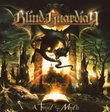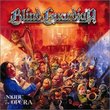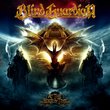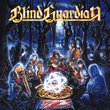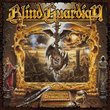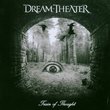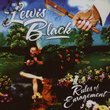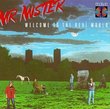| All Artists: Blind Guardian Title: Nightfall on Middle Earth (Reis) Members Wishing: 2 Total Copies: 0 Label: Century Media Original Release Date: 1/1/1998 Re-Release Date: 5/19/2009 Album Type: Original recording remastered, Extra tracks Genres: Pop, Rock, Metal Style: Number of Discs: 1 SwapaCD Credits: 1 UPC: 727701855929 |
Search - Blind Guardian :: Nightfall on Middle Earth (Reis)
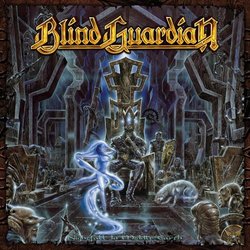 | Blind Guardian Nightfall on Middle Earth (Reis) Genres: Pop, Rock, Metal
|
Larger Image |
CD DetailsSimilar CDs
Similarly Requested CDs
|
CD ReviewsThe ultimate power metal concept album - remastered Justin Gaines | Northern Virginia | 06/18/2009 (5 out of 5 stars) "Just when I've convinced myself that Blind Guardian's 1995 album Imaginations From the Other Side is not only their best album, but the best power metal album ever, I listen to the band's 1998 epic Nightfall in Middle Earth and have to rethink my decision. When I think about epic metal, this is the album that immediately comes to mind (the 23-minute title track from Symphony X's Odyssey is a close second). Nightfall in Middle Earth is not just epic, it's EPIC. This is what Blind Guardian had been building towards for 10 years. The album, in case you hadn't guessed, is based entirely on the works of legendary fantasy author J.R.R. Tolkien, specifically The Silmarillion saga. Fortunately Blind Guardian's talent was a match for their ambition. Not only did the band faithfully adapt the source material, they included brief interlude tracks with sound effects and voice actors to help set the mood and ensure the story's progress. They did it well too, in case you were thinking of the uber-cheesy narration that Rhapsody kept inflicting on their listeners. All of the interludes on Nightfall in Middle Earth sounded as if they came straight from a major motion picture. And the actual songs are simply incredible. They're all extremely well written and well orchestrated power metal songs that are every bit as good as the stellar array of material on Imaginations From the Other Side. Nightfall in Middle Earth is arguably power metal's finest hour, and nothing short of a must-have power metal album. Once you experience it, it will no doubt become the standard by which you judge all other power metal albums. NOTE: The 2007 reissue of Nightfall in Middle Earth features digitally remastered sound (though to be fair the original version was a high quality recording to begin with) as well as a bonus track called Harvest of Sorrow, which was originally included as the b-side to their And Then There Was Silence single. It's also the English language version of the song Mies del Dolor (from A Night at the Opera). The song is also based on the Silmarillion, so it's inclusion on this reissue is quite fitting." A Great Collection of Songs Despite the Conceptual Filler J. Gordon | The World | 09/04/2010 (5 out of 5 stars) ""Heresy, I say!"....it's what I'm sure some of my fellow Blind Guardian fans may shout after reading my take on "Nightfall In Middle Earth". Yes, I gave it 5 stars, but while others may laud it as the "definitive" Blind Guardian album, this is a case where the parts are greater than the whole, unlike its predecessor, "Imaginations From the Other Side" (yeah, I know, Forgotten Tales was in between the two, but let's not split hairs.....). Although credit must be given to the band for taking a bit of a risk with the ultimate nerd-metal gamble of trying to create a full fledged concept album around part of "The Silmarillion" (essentially a back-story/biblical analogue for J.R.R. Tolkien's Middle Earth), some questionable decisions were made that were only overcome by the band's sheer songwriting and performing talent.
Prior to "Nightfall", Blind Guardian had been making a steady progression in incorporating huge harmonies and melodies into the bedrock of their original thrash/speed metal roots. "Tales From The Twilight World" was their first confident leap into a sound that emphasized melody as much as agression, although, to be fair, songs like "Valhalla" had flirted with this approach earlier. "Somewhere Far Beyond" saw the band shedding the remaining clumsiness in their approach, and delivered an epic experience, albeit not as heavy as it could've been. As stated above, "Imaginations From the Other Side" was probably their defining moment, as the band retooled the aggression of their earliest releases to incorporate their newer power metal melodicism. Perhaps the band felt that it would be fruitless to try to top "Imaginations" by continuing down that road, but in any case, "Nightfall In Middle Earth" was certainly not the insane, aggressive Blind Guardian we saw on "Imaginations". Instead, the band emphasized vocal and guitar melodies and harmonies, while shunting the rhythm guitar and drums to the background. The production, while certainly not deprived of "metal elements", was, shall we say, softer, more spongey, and layered with synthesized orchestration. The songs were more deliberate and measured in terms of both performance and structure; in fact, they were so much so, that Hansi Kursch relinquished bass duties to "perma-session" bassist Oliver Holzwarth due to what he saw as a necessary concession to the increasingly complex nature of the band's music (a division of labor that continues to this day). Perhaps the worst aspect of "Nightfall" is simply how it functions as an album. The album is riddled with short interludes, such as spoken word sections and miniscule musical intros, that only serve to disrupt the flow of music. True, Queensryche's "Operation Mindcrime" had them, and succeeded as an album, but they were more naturally and elegantly integrated into the album. In this case, they feel more cringeworthy than not, and I skip them without hesitation. They may appeal greatly to the Tolkien superfans (and I do enjoy Lord of the Rings myself!), but they simply do not work when they trip up the song-to-song flow. And the songs are simply just that damn strong enough to stand on their own, without unnecessary expository bits. While "Into the Storm" isn't what I'd consider the best opener, songs such as the waltzy "Nightfall", the powerful mid-tempo "Curse of Feanor", and the dynamic "Time Stands Still (At the Iron Hill)" all boast stunning guitar harmonies and massed vocal hooks that other bands would kill to just have a fraction of. "Blood Tears" uses a slightly psychadelic approach to create an unbridled sense of isolation. "Mirror Mirror" was the obvious choice for a single, and is so over-the-top, ridiculously catchy that it was destined to become a signature show-closer for the band. My belief that there's probably only 5% of the album that isn't multi-tracked and harmonized up the whazoo seems to be born out by a track such as "A Dark Passage", where a middle instrumental section manages to channel both Queen and Thin Lizzy via a stupendous cascade of harmonized guitar and syncopated rhythm. Oh, and let's not forget that song's nod to Eastern European/gypsy influences in the second verse! It's a shame, then, that this collection of outstanding, lyrically unified individual songs is loaded down with no less than 11 intrusive segue pieces. So there's my "heresy"; while this is a great piece of music that no metal fan should miss out on, I feel the "album" aspect has been hamstrung by overambition in terms of hammering the "concept" aspect home. It's a five star album with a bit of a caveat. So now that we've established that NIME is musically worthwhile in a major way, what does the remastered version bring to the table, as opposed to the original 1998 release? In terms of actual sound quality, the difference is there, but is more subtle than, say, the remastered version of "Battalions of Fear". The bottom end is more solid, there's some more separation and clarity present for background instrumentation, and both the bass and rhythm guitar seem to have more bite and presence. The other reason to own the remastered version is the inclusion of "Harvest of Sorrow", a gentle, beautiful ballad that's become a mainstay of the band's performances. Previously, the English version was only available on the single "And Then There Was Silence", even though most of the basic track had been completed during the "Nightfall" sessions. A delicate and quiet, yet sweeping, song of tragic romance (also drawn from the Silmarillion), it is fittingly included here as the last track, the calm after the storm, if you will. Though it may seem I've dwelt inordinately on the negative aspects of the album, it's only because they stand out in contrast to the memorable and classic music that is on display here, and which I highly recommend to the listener." |

 Track Listings (17) - Disc #1
Track Listings (17) - Disc #1